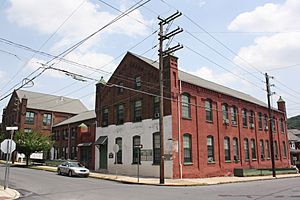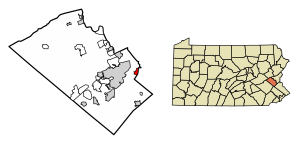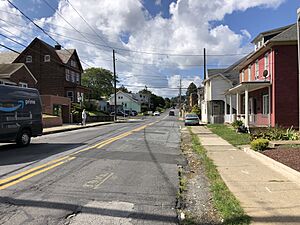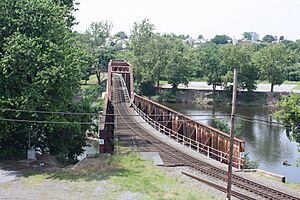Fountain Hill, Pennsylvania facts for kids
Quick facts for kids
Borough of Fountain Hill
|
||
|---|---|---|

Lehigh Valley Silk Mills in Fountain Hill in June 2013
|
||
|
||
| Motto(s): | ||

Location of Fountain Hill in Lehigh County, Pennsylvania (left) and of Lehigh County in Pennsylvania (right)
|
||
| Country | ||
| State | ||
| County | Lehigh | |
| Settled | 1739 | |
| Plotted | 1866 | |
| Incorporated | November 13, 1893 | |
| Named for | Fontainebleau Estate | |
| Area | ||
| • Borough | 0.75 sq mi (1.95 km2) | |
| • Land | 0.73 sq mi (1.90 km2) | |
| • Water | 0.02 sq mi (0.05 km2) | |
| Elevation | 364 ft (111 m) | |
| Population
(2020)
|
||
| • Borough | 4,832 | |
| • Density | 6,574.15/sq mi (2,536.99/km2) | |
| • Metro | 865,310 (US: 68th) | |
| Time zone | UTC-5 (EST) | |
| • Summer (DST) | UTC-4 (EDT) | |
| ZIP Code |
18015
|
|
| Area codes | 610 and 484 | |
| FIPS code | 42-27008 | |
| Primary airport | Lehigh Valley International Airport | |
| Major hospital | Lehigh Valley Hospital–Cedar Crest | |
| School district | Bethlehem Area | |
Fountain Hill is a small town called a borough in Lehigh County, Pennsylvania, United States. In 2020, about 4,832 people lived here. It's part of the larger Lehigh Valley area, which is home to over 860,000 people.
Contents
History of Fountain Hill
Early Settlement and Moravian Influence
Long ago, the land where Fountain Hill now stands was home to the Lenape Indians. In 1681, William Penn bought this land for his sons. The first building was put up in 1739 by a pioneer named Nicholas Doll.
Later, in 1743, the land was sold to the Moravians from nearby Bethlehem. For many years, the area was farmed by people who rented the land from the Moravians. The Hoffert family had the largest farm, and their farmhouse, built in 1755, is still the oldest building in Fountain Hill today.
The Mineral Spa and St. Luke's Hospital
In 1846, a doctor named Francis Henry Oppelt bought a small part of the land. He opened a hotel and a special mineral spa. Dr. Oppelt believed that the mineral waters could help cure illnesses. His spa was open for 25 years, from 1846 to 1871.
After Dr. Oppelt's business closed, the property was sold to Tinsley Jeter. In 1876, Jeter sold it to Asa Packer, who founded Lehigh University. Packer then gave the land to St. Luke's Hospital. The hospital moved from South Bethlehem to the former spa building.
Becoming a Borough
In 1848, the Hoffert farm was sold to people who wanted to build new homes. They built a large house called the "Fontainebleau Estate." Tinsley Jeter bought this estate and many other farms and mansions in the area in 1866. Many of these old mansions are still part of the Fountain Hill Historic District.
In 1866, Jeter decided to name the growing area "Fountain Hill." He chose this name because of the "Fontainebleau Estate" and because it was on a small hill. By 1886, several silk mills opened in the town as the Industrial Revolution brought new factories.
As more factories opened, more people moved to Fountain Hill. Even though it was growing, it was still just a village within Salisbury Township. But on November 13, 1893, after people asked the local government, Fountain Hill officially became its own town, called an incorporated municipality.
In 1905, the people of Fountain Hill decided not to join South Bethlehem to form a bigger city. Later, in 1919 and 1949, Fountain Hill added parts of Salisbury Township to its borders, making the town the size it is today. Around this time, a famous writer named Stephen Vincent Benét lived in Fountain Hill. He wrote a well-known poem called John Brown's Body in 1929. For many years, Fountain Hill was a popular place for people from Bethlehem to enjoy operas, plays, and theaters.
Geography of Fountain Hill
Fountain Hill is located at 40°36′6″N 75°23′47″W / 40.60167°N 75.39639°W. The U.S. Census Bureau says the borough covers about 0.7 square miles (1.95 square kilometers). Most of this area is land, with a small amount of water. Fountain Hill is mainly a residential area, meaning most of its space is used for homes. The town uses the Bethlehem ZIP code of 18015.
Transportation in Fountain Hill
In 2010, Fountain Hill had about 13.60 miles of public roads. Most of these roads are taken care of by the borough itself.
No major highways go directly through Fountain Hill. The main road in town is Broadway, which runs from the northeast to the southwest. The closest main highways are Pennsylvania Route 378 and Pennsylvania Route 412, which are just east of Fountain Hill.
Education in Fountain Hill
Students in Fountain Hill attend schools in the Bethlehem Area School District. Fountain Hill Elementary School, which teaches children from kindergarten to fifth grade, is located right in Fountain Hill.
Demographics of Fountain Hill
In 2010, there were 4,597 people living in Fountain Hill. Most residents, about 81.4%, were White. About 6.6% were African American, and 0.8% were Asian. People from Hispanic or Latino backgrounds made up 22.5% of the population.
| Historical population | |||
|---|---|---|---|
| Census | Pop. | %± | |
| 1900 | 1,214 | — | |
| 1910 | 1,388 | 14.3% | |
| 1920 | 2,339 | 68.5% | |
| 1930 | 4,568 | 95.3% | |
| 1940 | 4,804 | 5.2% | |
| 1950 | 5,456 | 13.6% | |
| 1960 | 5,428 | −0.5% | |
| 1970 | 5,384 | −0.8% | |
| 1980 | 4,805 | −10.8% | |
| 1990 | 4,637 | −3.5% | |
| 2000 | 4,614 | −0.5% | |
| 2010 | 4,597 | −0.4% | |
| 2020 | 4,832 | 5.1% | |
| 2024 (est.) | 4,690 | 2.0% | |
| Sources: | |||
Notable people from Fountain Hill
- Stephen Vincent Benét, a famous author
- Joseph F. Brennan, a former Pennsylvania State Representative
- Edwin Drake, known as the "Father of the Oil industry" for drilling the first crude oil well in America
- Justin D. Jirolanio, a former Pennsylvania State Representative and State Senator
- T. J. Rooney, a former Pennsylvania State Representative
- Alejandra Feliz, a singer and member of the music group Carlos & Alejandra
See also
 In Spanish: Fountain Hill (Pensilvania) para niños
In Spanish: Fountain Hill (Pensilvania) para niños
 | Misty Copeland |
 | Raven Wilkinson |
 | Debra Austin |
 | Aesha Ash |






